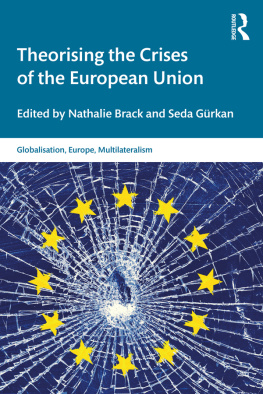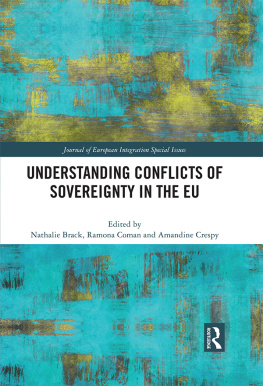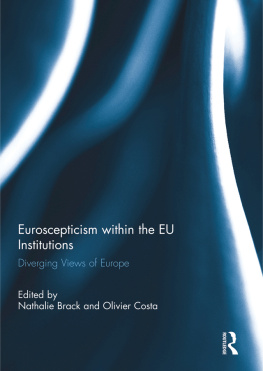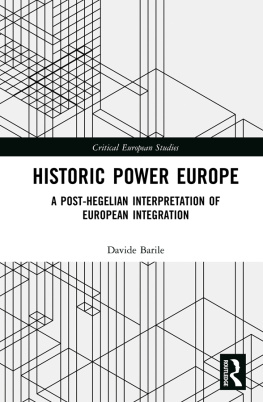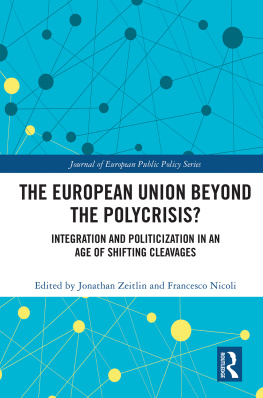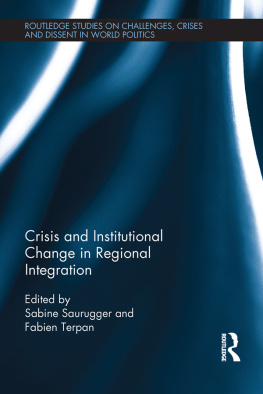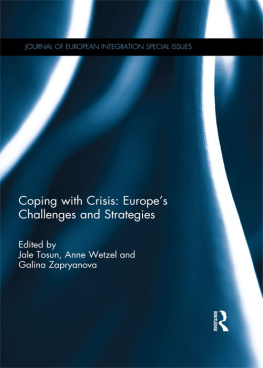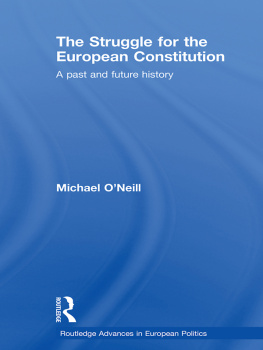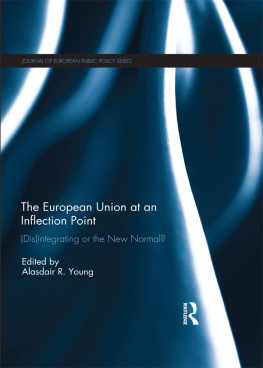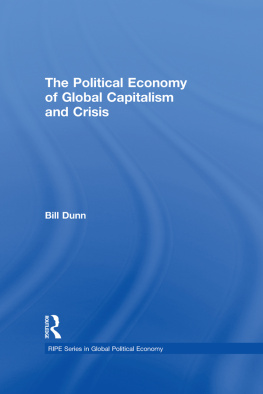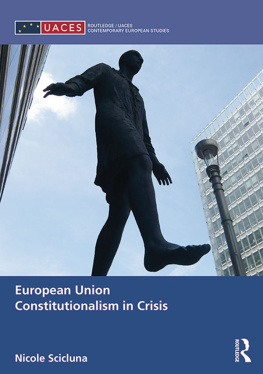An outstanding volume edited by two leading scholars of EU studies, this is one of the most sophisticated and systematic treatments of Europes age of crisis that I have seen. Ecumenical in its approach, the chapters test old and new theories of European integration against the crises of the last decade. The editors have done an excellent job in ensuring the coherence of the volume. The final result is far more than just the sum of its parts.
Christopher Bickerton, University of Cambridge, UK.
Drawing on new research, this volume highlights the strengths and weaknesses of current theories of European integration. The authors provide a comprehensive guide to our understanding of the European Union and how it has responded to the crises of the past decade. The result is a diverse, engaging, and deeply informative volume that is a valuable resource for students of European politics.
Gary Marks, UNC-Chapel Hill, USA, and European University Institute, Italy.
Theorising the Crises of the European Union
This book examines the relevance of integration theories for studying and analysing the crisis situations faced by the EU since 2009.
Ten years on from the start of the age of crisis, it critically analyses the impact of the multiple crises context on the EU polity and questions the utility of integration theories for grasping the peculiarities of the particular crisis under study. Bringing together prominent scholars in EU studies, the volume constitutes an essential reference book on integration theories. Its contribution is twofold. First, it provides a comparative overview of classical integration theories for studying and analysing current crisis situations the EU faces. Second, the book connects theories to current debates through an in-depth discussion of recent crises that hit European integration since 2009, with a particular focus on the financial crisis, Brexit, refugee crisis, illiberal tendencies in some member states, and the Coronavirus pandemic.
This book will be of key interest to scholars and students of European integration, European Union politics, political theory, and, more broadly, to European studies.
Nathalie Brack is Assistant Professor at the Faculty of Philosophy and Social Sciences and at the European Studies Institute of Universit libre de Bruxelles (ULB), Belgium.
Seda Grkan is Lecturer at the Faculty of Philosophy and Social Sciences and at the European Studies Institute of Universit libre de Bruxelles (ULB), Belgium.
Globalisation, Europe, Multilateralism Series
Series Editor: Mario TEL
Universit Libre de Bruxelles, Belgium
LUISS-Guido Carli
Rome, Italy
Series Manager: Frederik PONJAERT
Universit Libre de Bruxelles, Belgium
With the institutional support of the Institut dtudes europennes-Universit libre de Bruxelles
The series offers an interdisciplinary platform for original peer-reviewed publications on the institutions, norms and practices associated with Globalisation, Multilateralism and the European Union. Each published volume delves into a given dynamic shaping either the global-regional nexus or the role of the EU therein. It offers original insights into globalisation and its associated governance challenges; the changing forms of multilateral cooperation and the role of transnational networks; the impact of new global powers and the corollary multipolar order; the lessons born from comparative regionalism and interregional partnerships; as well as the distinctive instruments the EU mobilises in its foreign policies and external relations.
International Editorial Board
Christian LEQUESNE, IEP-Paris
Michael ZRN, WZB, Berlin
Regionalism and Multilateralism
Politics, Economics, Culture
Edited by Thomas Meyer, Jos Lus de Sales Marques and Mario Tel
Theorising the Crises of the European Union
Edited by Nathalie Brack and Seda Grkan
For more information about this series, please visit: www.routledge.com
Theorising the Crises of the European Union
Edited by Nathalie Brack and Seda Grkan
First published 2021
by Routledge
2 Park Square, Milton Park, Abingdon, Oxon OX14 4RN
and by Routledge
52 Vanderbilt Avenue, New York, NY 10017
Routledge is an imprint of the Taylor & Francis Group, an informa business
2021 selection and editorial matter, Nathalie Brack and Seda Grkan; individual chapters, the contributors
The right of Nathalie Brack and Seda Grkan to be identified as the authors of the editorial material, and of the authors for their individual chapters, has been asserted in accordance with sections 77 and 78 of the Copyright, Designs and Patents Act 1988.
All rights reserved. No part of this book may be reprinted or reproduced or utilised in any form or by any electronic, mechanical, or other means, now known or hereafter invented, including photocopying and recording, or in any information storage or retrieval system, without permission in writing from the publishers.
Trademark notice: Product or corporate names may be trademarks or registered trademarks, and are used only for identification and explanation without intent to infringe.
British Library Cataloguing-in-Publication Data
A catalogue record for this book is available from the British Library
Library of Congress Cataloging-in-Publication Data
A catalog record for this book has been requested
ISBN: 978-0-367-43126-6 (hbk)
ISBN: 978-1-003-00142-3 (ebk)
Typeset in Bembo
by Apex CoVantage, LLC
Contents
Nathalie Brack and Seda Grkan
Christopher Lord
Nathalie Brack, Ramona Coman and Amandine Crespy
Swen Hutter and Ines Schfer
Dermot Hodson
Zoe Lefkofridi and Philippe C. Schmitter
Christian Rauh
Sabine Saurugger
Ian Manners
Seda Grkan and Luca Tomini
Uwe Wunderlich and Stefan Gnzle
Benjamin Leruth
Seda Grkan and Nathalie Brack
Nathalie Brack is Assistant Professor of Political Science at Universit libre de Bruxelles and Visiting Professor at the College of Europe (Bruges). Her areas of expertise include Euroscepticism, EU institutions, political representation, and legislative studies. Her research has been published in the Journal of Common Market Studies, Representation, the International Political Science Review as well as by Routledge and Palgrave among others. She recently co-edited a special issue of the Journal of European Integration on sovereignty conflicts in the EU (with A. Crespy and R. Coman), and she currently leads the ARC project Mind the Gap. Examining congruence in a comparative perspective.
Ramona Coman is Associate Professor and President of the Institute for European Studies at Universit libre de Bruxelles (ULB). Her research focuses on EU integration, EUs rule-of-law promotion, and judicial reforms in Central and Eastern Europe. She coordinates the Jean Monnet Module Rule of Law and Mutual Trust in Global and European Governance. She co-edited Governance and Politics in the Post-Crisis European Union

